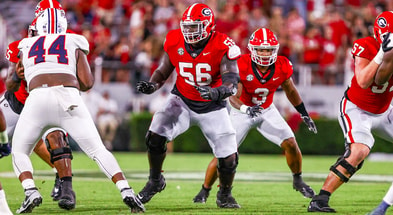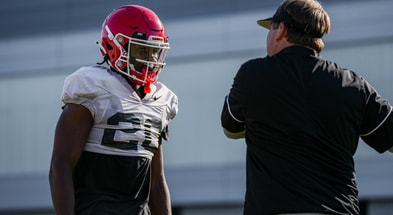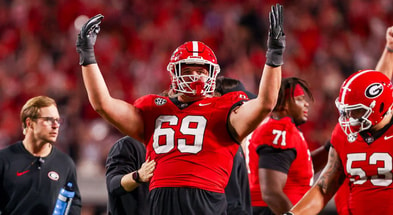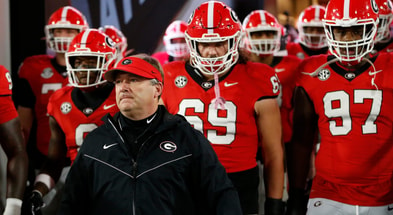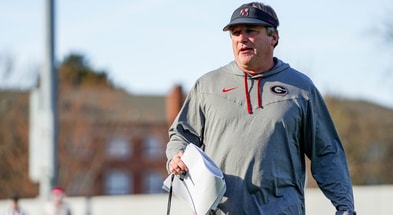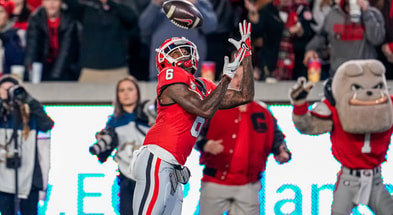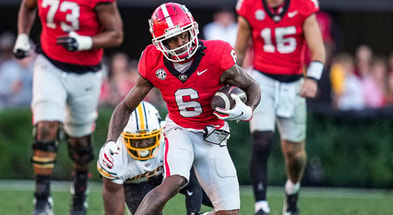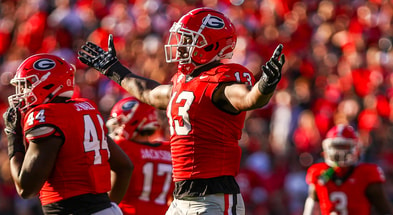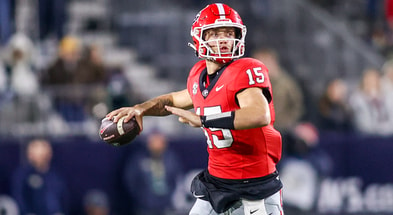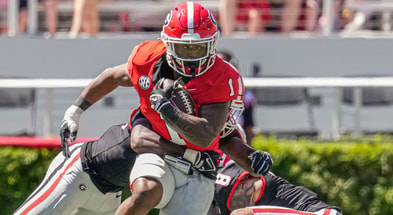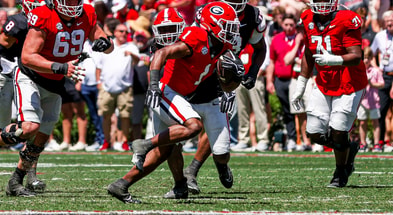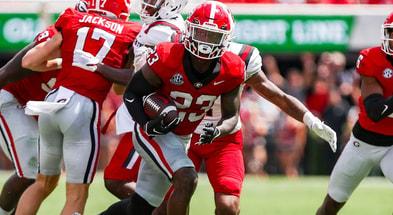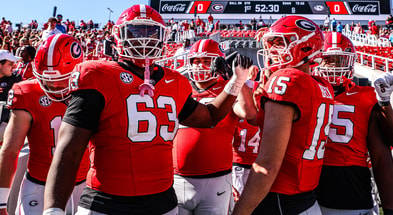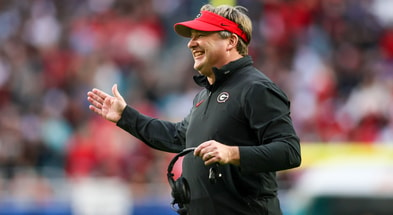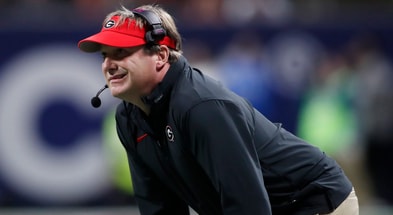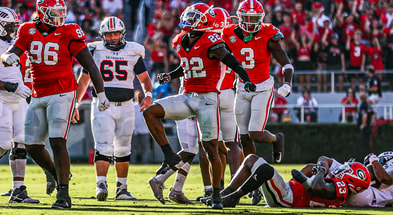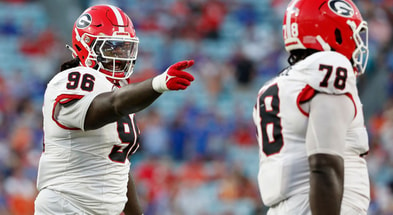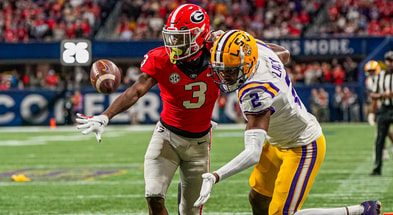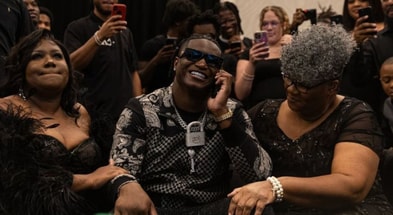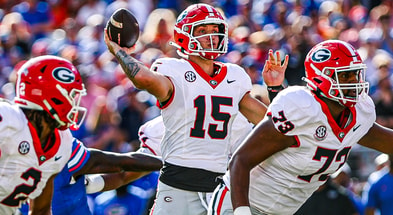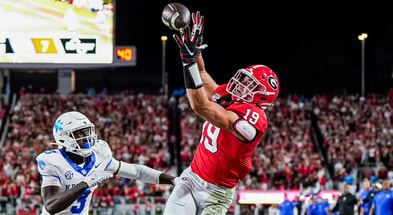Georgia issues a demand for retraction to the AJC
The University of Georgia claims that the Atlanta Journal-Constitution got some things wrong in it’s recent reporting on the schools football operation. According to a document obtained by DawgHQ via an open records request, UGA has issued a demand for retraction to the state’s biggest newspaper.
DawgsHQ has provided the full letter for you below. The letter is signed by UGA’s General Counsel, Mike Raeber.
Re: Demand for Retraction Ladies and Gentlemen:
I write on behalf of the University of Georgia Athletic Association to demand the prompt
retraction of a recent article authored by investigative reporter Alan Judd, entitled “UGA football program rallies when players accused of abusing women, ” published by The Atlanta Journal- Constitution online on June 27, 2023, and on the front page of the print edition on Sunday, July 2, 2023. This article is the latest in a series by Mr. Judd focused on the UGA football program in the aftermath of the tragic accident on January 15 of this year. We have strongly disagreed with many aspects of Mr. Judd’s reporting over the last six months. But for an organization whose Newsroom Ethics Code (www.ajc.com/ethics-code/) states that “professional integrity is the cornerstone of our credibility,” this most recent article crossed a new line.
Mr. Judd’s article is replete with errors, unsubstantiated allegations, innuendo, and possibly even fabrications. We do not write to you lightly; we are accustomed to the rough scrutiny of a robust press, and we appreciate its central importance in a free society. But this article stands out in its reckless disregard for the truth and its imposition of a damaging narrative unsupported by the facts. The AJC’s Newsroom Ethics Code states, “In our news reports, we do not lie; we do not fabricate, and we do not distort images or audio in a manner that is misleading.” Yet several parts of Mr. Judd’s article beg the very concerning conclusion that aspects of his reporting are indeed fabricated, whether knowingly or recklessly.
Without these significant errors, distortions, and potential fabrications, there is simply no basis for the article’s central thesis-t h a t the UGA football program actively supports players accused
of abusing women. Consider that thesis and how abhorrent it is. To quote Carl Sagan, “Extraordinary claims require extraordinary evidence.” But time and again, the article fails to provide any credible factual bases for its sensational claims. We do not shy away from good reporting that informs the public and helps us consider our programs and the ways we can improve them. But we also do not shy away from calling out reporting that fails to meet these standards.
The AJC Newsroom Ethics Code proclaims, “We admit our errors and correct them.” I write today to demand just that-an admission of error and a retraction of the article. The retraction should be prompt, clearly identified as a retraction, and featured and promoted as conspicuously and publicly as the original article.
“Rallying” in Support of “II Players”
The central contention of Mr. Judd’s article appears in the headline: “UGA football program rallies when players accused ofabusing women: Athletes often remain on team despite sexual assault, domestic violence allegations.” “In case after case, the newspaper found, strong on-field performance appears to excuse bad off-field behavior,” the article states. The article’s thesis is not that UGA’s football program condones or tolerates sexual misconduct, but that it actively supports players accused of such behavior. As support for this proposition, Mr. Judd claims: “The Journal-Constitution identified I1 players during Smart’s tenure who remained with the team after women reported violent encounters to the police, to the university, or to both.” Yet the article only identifies two players byname and another without naming him.
Noting this discrepancy and skeptical of the claim, we asked Mr. Judd to provide a full list of the eleven players that meet his description. He initially responded he was away from his office without his files but would respond when he returned to the office. After repeated follow-ups, Mr. Judd refused to provide the list. He claims the AJC has a “policy” not to “release unpublished information,” although he has not provided a copy of or citation to this policy. Even if such a policy exists, the AJC did publish this information. Mr. Judd published an entire article excoriating the UGA football program for “rallying” on behalf of players accused of abusing women, primarily based on the assertion that “11 players” remained on the team after being accused. The AJC Newsroom Ethics Code states that theAJC is “transparent” about its “newsgathering methods.” But when asked simply to provide a list of the eleven names referenced in the article, Mr. Judd refused. We are confident there are not “11 players during Smart’s tenure who remained with the team after women reported violent encounters” to the police or University; indeed, even the three players mentioned in Mr. Judd’s article do not meet this description. Mr. Judd’s refusal to provide the factual basis for his assertion calls his credibility into serious question. But while refusing to provide the basis for his sensational claim, Mr. Judd continues to repeat it in media interviews.
In one recent interview, M.r Judd described the situations involving the three players described in his article as the “most egregious and “most serious” examples of UGA rallying for players accused of violence against women. But none of the three examples supports Mr. Judd’s claims. One individual was not a member ofthe program when the accusation was made; Athens-Clarke County Police investigated the allegation and determined the activity was consensual; and the individual was never charged. The second individual was suspended immediately when the program learned of the sexual assault allegation, and his college career ended without ever playing another down, even though to this day he has not been convicted and remains innocent until proven guilty. And the third player was immediately suspended and never played again for UGA after being charged with unlawful surveillance (not sexual assault, as Mr. Judd claims), even though the charges were ultimately dismissed. These are hardly examples of players “remaining on the team” after being accused of”violent encounters” with women, much less of a program “rallying” behind them. And these are the cases Mr. Judd describes as the “most serious” examples of his claim that the football program actively supports student-athletes accused of abusing women.
Perhaps most concerning, Mr. Judd falsely describes the third case in an effort to make it fit his
narrative. In the article, M.r Judd states without qualification: “A player charged with recording a sex act with an unconscious woman remained on the roster for a full season until he transferred.” In a subsequent media interview, Mr. Judd again referred to this case, claiming the player videotaped himself “having sex with a woman who had passed out from drinking.” nI the same interview, he again referred ot the player videotaping himself “having sex with a woman blackedout drunk.” Mr. Judd then suggested the player received preferential treatment from the Athens-Clarke County police, saying that “strangely” the police did not charge him with sexual assault “even though the video shows that she had no idea what was happening.”
The AJC requested the police reports and underlying videos for this case from the UGA Police
Department under the Open Records Act. But the supplemental police reports have not yet been
produced to the AJC, and the requested videos of the underlying sex acts are legally exempt from production because their release would violate the personal privacy rights ofthe complainant in the case.
If Mr. Judd has obtained the videos and/or supplemental police reports for this case from some other source and has reviewed them, then he is knowingly misrepresenting their contents; if he has not seen the videos and supplemental reports, then his version of events is simply fabricated
The former player involved in this case was charged with unlawful surveillance for engaging in consensual sexual activity and recording it without consent. As a result of the charge, this player was suspended from competition and never played a single down for the program, even though the unlawful surveillance charge was later dismissed. But the former player was never charged with sexual assault because, according to the police reports, the videos depicted the complainant as “engaged and responsive” and “actively participating” in the sexual activity contrary to Mr. Judd’s false claims. According to the supplemental police reports, the videos “display consensual sex” between the parties. All of this is documented in extensive detail in the supplemental police reports that Mr. Judd requested, but either has not reviewed or is misrepresenting. His repeated public assertions that this former player remained on the roster after being “charged with recording a sex act with an unconscious woman” are simply false. Reporting on a subject matter of utmost seriousness, Mr. Judd chose to create the story he
wanted to tell regardless of the facts.
Given Mr. Judd’s approach, it is telling what he leaves out of his narrative. Mr. Judd’s article fails to mention a matter that was publicized by the AJC itself in 2019. As reported by the AJC at the time, in the summer of 2019, he team’s leading returning wide receiver was accused by a former girlfriend of physically assaulting her over a year earlier. According to the police report, the victim did not want to pursue the case, and the player was never charged. Nevertheless, within days of receiving the report and verifying its veracity, the team’s leading returning wide receiver was immediately and permanently dismissed from the team. The AJC claims it has invested extensive resources into the investigation and reporting of these issues. But UGA’s prompt dismissal of a star player never charged with a crime even though covered by the AJC at the time and therefore surely known by Mr. Judd after his extensive research obviously did not fit Mr. Judd’s narrative that “strong on-field performance excuses bad off-field behavior.” Surely a journalist truly committed to “the highest standards of truthfulness” would have mentioned this incident. Athens-Clarke County Police Department Interview Mr. Judd’s article extensively covers a matter involving a 16-year-old prospective student- athlete, Jamaal Jarrett, accused of sexual assault during his recruiting visit. Mr. Judd questions the rigor of the Athens-Clarke County Police Department’s investigation of the case, characterizing it as “remarkably friendly” and “more like a counseling session.” He claims the video of the interview “suggests criminal charges were never likely.” These subjective assessments are based on two phrases totaling eight words-b o t h taken out of context-from a 54-minute interview.
Mr. Judd first describes the interview as “a remarkably friendly interrogation at the Athens police headquarters, where the detective investigating the sexual assault allegation spoke of ‘my beloved Bulldogs.” The words “my beloved Bulldogs” were uttered by the Detective twenty-two minutes into the 54-minute interview, when Mr. Jarrett explained that the complainant had searched for him online and initiated contact with him after seeing him from a distance at the January 2022 National Championship Parade. Recalling the day of the Parade and lamenting that he was required to be on duty that day, the Detective noted sarcastically, “One of many Saturdays I had ruined, working on behalf of my beloved Bulldogs.”
At the conclusion of the article, Mr. Judd returns to his criticism of the ACCPD interview, claiming the video “suggests criminal charges were never likely. At times the interrogation seemed more like a counseling session.” The article continues:
- “I’m looking out for you,” Schmidt told Jarrett. “No matter how this plays out, I think there’s a lot you can learn from it.”
This quote might support Mr. Judd’s false narrative. But the Detective did not say these words
as presented byMr. Judd. The actual quote, which occurred at the 39:40 mark of the interview, was:
- “And I’m not trying to overstep my role or get in your personal business, but no matter how this plays out, I think there’s a lot you can learn from it.”
The words “I’m kind of looking out for you” occurred six minutes earlier in the interview in a
completely different context. The full context of that statement does not remotely support Mr.
Judd’s suggestion that ACCPD was giving the suspect preferential treatment. Instead, the ful text of the statementcame as the Detective warnedMr. Jarrett not to contact the complainant:
- “And this is one of those things that goes without saying, but I want to say it. Um. Not a good idea ot have any contact with her moving forward. Everyone’s on the same page there, right? It’s just going to it’s not going to do anything to help you, and it could make things more complicated or worse for you. And that’s -you know I’m kind of looking out for you in the context of this case, but also outside of this case. Just as, you know, somebody the age of your parents, you know, because, it’s like Mom said, you know, she’s . for the report, she’s the victim, you’re a suspect. But she is older, and, you know, there’s some issues going on. It’s just . .. like I said, people are complicated, and there’s just all kinds of trouble that can come from that.”
No objective person would interpret this statement as expressing preferential treatment for the suspect. But Mr. Judd takes five words out of context and splices them together with an unrelated statement to suggest the ACCPD investigation was biased.
In any event, Mr. Judd’s subjective characterization of the interview is belied by the video itself. This was a 54-minute interview of a 16-year-old who had been accused of sexual assault by a 20-year-old who had initiated contact with him, booked a room at his hotel, and acknowledged engaging in consensual sex with him. Mr. Jarrett was not under arrest, the interview was voluntary, and he was not represented by counsel. Nevertheless, before the interview even began, ACCPD seized M.r Jarrett’s phone. At the outset ofthe interview, the Detective gave Mr. Jarrett a Miranda warning. nI the interview, the Detective repeatedly challenged Mr. Jarrett’s account, asking him several times to reconcile his version of events with the complainant’s accusations. The Detective reminded Mr. Jarrett that ACCPD had possession of his phone and would examine it forensically, admonishing him that it would be problematic if his account was inconsistent with the evidence on the phone. The Detective took buccal swabs ofMr. Jarrett’s cheeks. And he explained to Mr. Jarrett that further investigation and criminal charges were possible.
Notwithstanding Mr. Judd’s insinuation that a police interview of a 16-year-old in this context
should be hostile or confrontational, his use oft wo out of context phrases (and one fabricated quote) from a 54-minute interview to characterize it as “remarkably friendly” is simply wrong.
“Rallying”for Adam Anderson
Mr. Judd’s other example in support ofhis assertion that the UGA football program “rallies”for players accused of abusing women concerns a Bond Hearing for a former player, Adam Anderson. A group of football players voluntarily chose to attend Mr. Anderson’s Bond Hearing. While the players’ motives for attending are their own, they did so in their private capacities as friends and teammates. On November 15, two days before the hearing, Mr. Anderson’s lawyer, Steve Sadow, had emailed me, as the University’s General Counsel, to “respectfully request on Adam’s behalf that UGA allow any player who wants to support Adam to attend the hearing.” I responded in writing to Mr. Sadow: “The decision to participate in legal proceedings is completely up to the student-athletes subject to their academic, athletic, and other obligations. Our only role would be sharing information to help them make that individual decision.”
Nevertheless, Mr. Judd claims in the article that Mr. Anderson’s lawyer, Steve Sadow, said he had “secured Smart’s blessing through the university’s chief lawyer” for the players to appear. In a tweet on June 28, Mr. Judd repeated that “the jailed player’s lawyer said they appeared with Kirby Smart’s blessing.” (emphasis added). But Mr. Sadow never said this.
In fact, the transcript of the Bond Hearing does not contain the evocative words “bless” or “blessing.” It only contains one reference to Coach Smart, in which Mr. Sadow asked the Judge if the players could be excused from the hearing to return to team activities “pursuant to my promise to Coach Kirby Smart.”
Likewise, the hearing transcript contains only one reference to the University’s legal counsel. In his closing argument at the conclusion ofthe Bond Hearing, Mr. Sadow referred to the dozens of individuals who attended in support ofMr. Anderson’s request for bond: “These people are here not because they want him to play football. They’re here because they know him, they’ve known him for years and years and years.” Mr. Sadow then specifically referred toMr. Anderson’s teammates, making crystal clear that the decision to attend was solely their own: “And his football players I had to communicate with general counsel for the University of Georgia in order ot make certain that the players would be free to come ni here and testify or be present. This was not forced upon them. Those individuals chose to be here; voluntarily. …” (emphasis added).
As the record makes clear, the decision to attendthe hearing was purely a personal decision for the players, and it would have been inappropriate (and perhaps unconstitutional) for Coach Smart or any other Athletic Association official to either encourage or discourage players or staff from exercising their personal rights to express their views in the matter on behalfo feither party.
Mr. Judd’s claim that Mr. Sadow said he had secured Coach Smart’s “blessing” through General Counsel for the players’ attendance is inaccurate. And his suggestion that a purely personal decision by players and a staff member to attend a teammate’s Bond Hearing illustrates an entire football program “rallying” behind individuals accused of violence against women is even more irresponsible.
Mr. Judd’s article also claims that the University “assist[ed]” Mr. Anderson by responding to a lawful subpoena for records. Mr. Judd cites an executive director from the Clery Center for the proposition that “[ffederal law requires schools to keep such records confidential.” But Mr. Judd fails to mention that applicable federal law contains an exception for records responsive to a awfully issued subpoena, and the University therefore had nobasis to withhold the documents.
Federal law generally prohibits schools from producing student educational records, but contains an express exception for disclosure to comply with a “lawfully issued subpoena,” as long as the university makes a reasonable effort to notify the student in advance o f compliance so that the student can intervene and object.
In this case, the University received a lawfully issued subpoena from Mr. Anderson’s counsel for a student’s education records. As required by federal law, the University provided written notice to the student and did so well in advance of the subpoena’s deadline. The student’s lawyer filed a motion to quash the subpoena but not until the day of the deadline, and therefore theJudge had not ruled on the motion by the time the University was required to produce the documents. Out of an abundance of caution and respect for the student’s privacy rights, rather than producing the documents directly to the requesting party (as the University was arguably required todo), the University instead tendered the documents to the Court to hold until it could rule on the motion. The Court subsequently denied the motion to quash and provided the documents to Mr. Anderson’s counsel.
Although the University had no legal basis to refuse to comply with a valid subpoena-and the article does not cite one – Mr. Judd nevertheless mischaracterizes this episode as an example of the University’s “willingness to assist an athlete facing criminal charges.”
Comparisons with Prior Head Coach
Mr. Judd attempts to draw a distinction between the treatment of these issues under Coach Smart and the prior head coach, Mark Richt. As support, Mr. Judd claims Coach Richt “routinely dismissed players accused in sexual and domestic assaults, including two in a single off-season.” But Mr. Judd provides no comparison between the number of players dismissed from the team under either coach. He also assumes without any basis that fewer dismissals would be indicative of more lenient discipline, as opposed to fewer incidents. Mr. Judd provides no factual basis for his suggestion that the program’s priorities under Coach Smart are “skewed” compared to the previous coach or that the program under either coach failed to address these issues decisively and appropriately.
Previous Examples of Bias and Inaccurate Reporting
Unfortunately, while this most recent article is the most egregious example of Mr. Judd’s biased and inaccurate reporting about UGA’s football program, it is not the first. On February 24, 2023, Mr. Judd reported sensationally that a”star football player for the University of Georgia allegedly led a police officer on a high-speed chase through the Athens campus on Jan. 10. In fact, police records in the AJC’s possession showed that the alleged “pursuit” occurred on the bypass outside of Athens, not through campus; the student-athlete was not aware he was being pursued; and “at no point was [the officer] directly behind [the] vehicle with his lights or sirens activated.” Hardly a “high-speed chase through campus.”
On March 14, 2023, Coach Smart held a press conference before spring practice. It was attended by AJC journalists, including Mr. Judd. Coach Smart referred to the “expectations we have here at Georgia for our student-athletes,” saying, “certainly we haven’t met some of those requirements.” Later, in response to a question from Mr. Judd about control and supervision of the program, Coach Smart stated, “Our guys do make mistakes. . . . Our job as coaches is to prevent that from happening, and that starts with me.” Nevertheless, immediately after the press conference, Mr. Judd tweeted, “In press conference, #uga coach Kirby Smart accepts no responsibility for series of transgressions that culminated in deaths o fa player and recruiting staffer in January car crash.” (emphasis added).
On March 31, 2023, Mr. Judd reported that Director of Player Support Bryant Gantt “intervened” on behalf of a UGA Athletics staff member concerning a speeding ticket in Morgan County. The article claimed Mr. Gantt asked a Morgan County Traffic Clerk “to amend the ticket to indicate LeCroy was driving only 14 mph over the speed limit.” When Iemailed the Clerk toask fi this report was accurate, she responded in writing, “That’s very inaccurate,” saying she was very upset by Mr. Judd’s”false accusations.” The Clerk explained that Mr. Gantt’s question was one she gets frequently–whether the staffer was eligible for a defensive driving course to reduce the amount of fine and/or points, as expressly provided under Georgia law. She said the interaction was brief, Mr. Gantt did not attempt to influence her in any way, and she found nothing inappropriate about the interaction. Even when the University provided the Clerk’s denials to the AJC, the AJC refused to correct Mr. Judd’s reporting.
On June 11, 2023, the AJC ran a story co-authored by Mr. Judd entitled “Out of Control: Reckless culture off the field marks UGA football team.” The article includes quotes from a former Athens-Clarke County Deputy Solicitor about M.r Gantt’s role assisting student-athletes in resolving traffic violations. In an unsolicited email ot M.r Gantt after the story ran, the former Deputy Solicitor stated that “all my direct quotes weretaken completely out of context and used in a tone negative to you and the Athletic Association. This was not at all the tone of my conversation with the reporter.” She said she told the AJC that “many of these guys were far away from home, and where local kids would have their parents’ support through the court process, many of these kids did not, and that was a role you helped fil: surrogate parent. I told him it was not uncommon for other UGA students to come to court with their parents and for parents to call and e-mail me about their child’s case, and that was the role you filled for the football players.” She concluded, “I’m truly sick to my stomach that my attempt to show you in a more positive light has been twisted into something negative. I guess I shouldn’t be
surprised. The reporter clearly made every effort to frame the article in a way that made the entire Athletic Department look bad.” (emphasis added).
Despite dedicating a “team of reporters” to “investigate] the crash for months,” Mr. Judd contacted UGA for comment just one day before the story ran. Early the next morning, the Athletic Association provided a statement and specifically requested that the AJC include the entire statement alongside the story. Yet Mr. Judd’s story included portions o fjust six of the eighteen sentences from the AthleticAssociation’s statement, omitting some of the most significant points those that directly countered his preconceived narrative.
After the Athletic Association pressed again for inclusion of its statement, the AJC appended a portion of the statement at the end of its online version of the story. Despite including just six of eight sentences from the Athletic Association’s statement, the AJC misleadingly described its excerpts as “Response from UGA Athletic Association,” failing to note that the AJC had truncated the statement. In the Sunday print edition, the story appeared on the front page and carried over to two full pages, but the AJC still refused to the include the Athletic Association’s entire statement as requested.
Conclusion
The AJC prominently touts its “commitment to seek the truth and provide accountability of public institutions.” It further proclaims: “As journalists, we must earn the trust of our audience every day. Our professional integrity is the cornerstone of our credibility. Fairness and transparency must always be the hallmarks of The Atlanta Journal Constitution’s journalism.
Mr. Judd’s most recent article falls far short of these standards. Absent the numerous and significant inaccuracies identified in this letter, there is simply no foundation for the central premise of the article that the UGA football program actively supports players accused of abusing women. For the foregoing reasons, we demand the AJC’s prompt, clear, and conspicuous retraction of the article.
